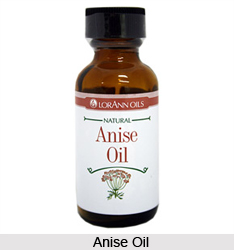 Anise Oil is derived from the perennial herbal plant anise or aniseed (Pimpinella anisum), also called sweet cumin, through extraction by steam distillation of its dried ripe fruits and seeds. The herb has been used as a spice and flavouring agent in food and beverages since ancient times. In India and few other countries, the herb is in use also as a mouth freshener and digestive agent. The herb has medicinal properties which became known long ago in ancient Greece, Rome and Egypt. Due to its similarities with fennel, it is called by the same name "saunf" in Indian and Pakistani cuisines. Some use the term `patli saunf` (thin fennel) or "velayati saunf" (foreign fennel), to distinguish it from fennel. The characteristic aroma of Anise Oil which comes from its prime constituent Anethol, makes it useful in aromatherapy. It has a pungent liquorice-like aroma.
Anise Oil is derived from the perennial herbal plant anise or aniseed (Pimpinella anisum), also called sweet cumin, through extraction by steam distillation of its dried ripe fruits and seeds. The herb has been used as a spice and flavouring agent in food and beverages since ancient times. In India and few other countries, the herb is in use also as a mouth freshener and digestive agent. The herb has medicinal properties which became known long ago in ancient Greece, Rome and Egypt. Due to its similarities with fennel, it is called by the same name "saunf" in Indian and Pakistani cuisines. Some use the term `patli saunf` (thin fennel) or "velayati saunf" (foreign fennel), to distinguish it from fennel. The characteristic aroma of Anise Oil which comes from its prime constituent Anethol, makes it useful in aromatherapy. It has a pungent liquorice-like aroma.
Health Benefits of Anise Oil
Anise Oil has immense and varied therapeutic properties of an antiseptic, expectorant, stimulant, insecticide, laxative, etc. Apart from its culinary and flavouring uses, Anise Oil is a remedy to a wide range of health ailments.
•As a narcotic and sedative: Helps easing epilepsy and hysteria.
•As a painkiller: Relieves from arthritic and rheumatic pain.
•As an antiseptic: For faster healing of wounds and preventing infections.
•As a decongestant or expectorant: Helps in clearing congestion in the respiratory tract and lungs, helping in asthma and bronchitis.
•As a stimulant: Stimulates the nervous system and boosts metabolism.
The aromatic factor of Anise Oil is very effective in:
•Eliminating intestinal worms in children;
•Relieving indigestion and flatulence;
•Relieving coughs by loosening mucus, nauseous migraines, muscle cramps and aches, vertigo and obstructed blood circulation;
•Driving breast milk production and easing menstrual pains with its phytoestrogenic properties;
•Relieving stress, anxiety, insomnia, depression and anger;
•Removal of natural head lice;
•In oral health (added in toothpastes and mouthwashes).
The oil is also added in soaps, detergents, lotions and skin creams for the fragrance factor. It is toxic to insects.
Safety of Anise Oil
Anise Oil blends well with other essential oils of Cardamom, Fennel, Coriander and Rosewood. However, sufficient care should be taken in consumption of anise oil. It is generally safe for human consumption and does not pose any threat when used in moderation. But when used or consumed in heavy and excessive doses, it can aggravate certain type of cancers, as anise is an estrogenic agent. In heavy doses, it also has narcotic effects, slows down respiration and circulation. It should not be given to children in high doses. It may cause irritation and problems to their delicate skin. It should be avoided in pregnancy. Consultation with a physician is strongly advised for its use.
Side Effects of Anise Oil
Anise Oil when consumed may result in any of these side effects, upon noticing or experiencing which, a doctor should be contacted immediately.
•Any allergic reaction;
•Mouth or lip inflammation;
•Nausea, vomiting and seizures;
•Skin irritation, especially in those with any skin condition or ailment.




















